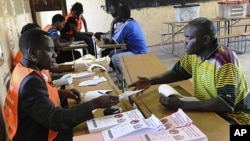Voting has been brisk as Zambians streamed to the polls in national and presidential elections, the outcome of which is expected to be close between incumbent Rupiah Banda of the Movement for Multiparty Democracy and the main opposition led by Michael Sata of the Patriotic Front. There were some incidents of unrest, and some logistical problems, but overall the poll has gone smoothly.
Most observers say the outcome of this election will be close but note that the major difference between now and the last presidential poll in 2008 is an increase of about one million young voters.
Paul Mwansa, a 44-year-old builder from the capital Lusaka, tells VOA young voters were out in large numbers and he says they could tip the scales in favor of opposition parties in this election.
"The way I look at it, as an individual, is that many of these people that have voted today, are maybe in their 20s or so, and these are boys and girls who were born when [the Movement for Multiparty Democracy] just assumed office in 1991. And now the other opposition has been preaching about change which from my understanding, these boys and girls would want to see," he said.
Most of these young voters are unemployed, and Mwansa says that the main opposition party, Michael Sata’s Patriotic Front, has capitalized on this.
"Particularly Sata’s party, the [Patriotic Front] has been promising that they will create jobs for these youths. So these boys and girls are looking for jobs," said Mwansa.
The Patriotic Front has also promised to introduce many more measures that will benefit the poor. Sixty percent of Zambia’s population lives on less than $2 a day.
In 2008, in a special presidential election after the death of the former president, incumbent Rupiah Banda of the Movement for Multiparty Democracy, MMD, beat Sata, his major political rival, by just 35,000 votes.
In the regular parliamentary election in 2006, the MMD won a sweeping victory with 73 percent, while the Patriotic Front trailed behind with 43 percent.
Leading up to this election, President Banda and his MMD were able to point to a much improved economy resulting from an international increase in demand for copper, Chinese investment and the scrapping of a windfall tax on mining companies.
In Zambia, vote counting usually takes two to three days.
Zambians Vote in National and Presidential Elections












